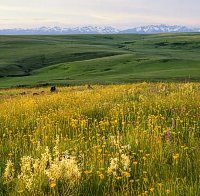|
|

|
|
What Does The Word "Upland" Actually Mean? That's a great question. If you poke around enough catalogs, web sites, and magazines, you'll see the term "upland" used widely, but rarely along with a clear definition of the word's meaning or history. The term is an old one, and has come to mean different things to different people when used in different contexts. Perhaps the first place to start would be with the dictionary definition, as seen in Webster's Revised Unabridged Dictionary: 
\Up"land\, n.Of course, many an upland hunter will laugh out loud at the phrase "generally dry" because one simply cannot pursue quail, pheasant, grouse, and other upland game without winding up, on occasion, completely soaked by rain, caked in snow, and covered in mud, manure, and bird droppings. That, of course, is why we care so much about good gear! To the extent that we're talking about the word "upland" largely in the context of that hunting niche, it's important to know why game birds are generally lumped into the categories of "upland" and "wetland." It's not because they aren't found in each other's ranges (plenty of quail hunters have been tempted by a shot at a mallard, and lots of goose hunters have spooked up pheasants on their way across a farmer's field to their blind). Rather, we can separate the "upland" birds by the fact that they don't need to be near a body of water or marsh in order to breed and raise chicks. But the distinction made in the definition above really does clarify the issue pretty well: deliberately mucking about in swamps while hunting ducks and geese is a completely different activity with its own attending gear, dogs, guns, and attitude. We're focused instead on the life and times of those hunters that like to stroll through miles of fields and woods, and for whom that lodge at the end of the hunt (and the meal that's going to be enjoyed inside) is just as important. "Uplands" refers to a type of terrain, but it also refers to a setting, and a frame of mind - a certain amount of distance (physical and psychological!) from the hustle and bustle of denser city and suburb existence. "Upland" used to be used interchangeably with "countryside," but now it connotes that and so much more. This web site is about the so much more. Note: There are all sorts of terms associated with upland pursuits, some of which are old and a bit arcane, and some of which you may have heard but never really quite understood. We're here to help! Visit our own exclusive Encyclopedia Uplandia for all sorts of useful reading. |
|
^Top | Home | About UplandLife.com | Contact Us | Advertising/Listings | Privacy / Policies | Site Map Entire contents copyright © 2026 UplandLife.com, All Rights Reserved. Content Technology From NorseCode. |